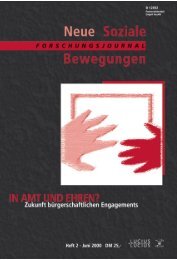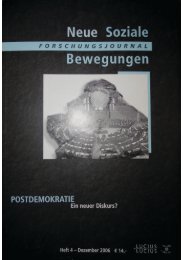Vollversion (5.75 MB) - Forschungsjournal Soziale Bewegungen
Vollversion (5.75 MB) - Forschungsjournal Soziale Bewegungen
Vollversion (5.75 MB) - Forschungsjournal Soziale Bewegungen
Sie wollen auch ein ePaper? Erhöhen Sie die Reichweite Ihrer Titel.
YUMPU macht aus Druck-PDFs automatisch weboptimierte ePaper, die Google liebt.
FORSCHUNGSJOURNAL NSB, JG. 8, HEFT 1, 1995<br />
Dieter Rucht: Collective identity: Conceptual reflections on an important tool of<br />
social movement research; FJ NSB 1/1995, pp. 9-23<br />
The author stresses the crucial importance of collective identity in order to locate social<br />
movements. He analyzes the collective identity of social movements in a threefold manner,<br />
adapting the concepts of identite, Opposition and totalite by ALAIN TOURAINE: Collective<br />
identity as the connection of interactions based on a certain structural network, as a challenge for<br />
other social groups and as the 'interpretor' of a social conflict. RUCHT discusses these three<br />
dimensions in the light of recent theories within the realm of social movement research. He<br />
concludes with some remarks on the factors which may constribute to the decline of the collective<br />
identity of social movements. Positively spoken: To stabilize collective identity permanently it is<br />
necessary to keep the adequat relationship between exclusion and inclusion of a social movement.<br />
Oliver Schmidtke: Collective identity and the political mobilization of territorial<br />
movements: An analytical perspective; FJ NSB 1/1995, pp. 24-31<br />
The function of collective identity is defined as a means to standardize social relationships and to<br />
secure continuity. SCHMIDTKE distinguishes three types of collective identity: primordial,<br />
cultural, and civic identity. The author reconstructs how the identity of the Italian Lega Lombarda<br />
had shifted from a primordially defined one towards a cultural identity. This was due to a changed<br />
'political opportunity structure' that necessitated an extension of 'politics of identity' to mobilize<br />
people beyond the initially restricted territory of Northern Italy and to gain relevance in the whole<br />
country.<br />
Veit Michael Bader: Ethnic identity and ethnic culture. Limits of constructivism and of<br />
manipulation; FJ NSB 1/1995, pp. 32-45<br />
Collective ethnic identity is the focus of this essay. BADER defines collective identity in general<br />
(1) by an awareness of belonging to a group, (2) by the discrimination of non-members, (3) by the<br />
collective interpretation of belonging, (4) by a functional relationship towards individual identity<br />
that induces action for the individual, (5) by situations of rivalry and struggle and (6) by a mutual<br />
relationship of definitions of oneself by oneself and by others. Ethnic identity is also discussed<br />
referring to ANTHONY SMITH's study 'The Ethnic Origins of Nations' (1986).<br />
Bernd Simon: Individual and collective seif: Sociopsychological basics of social<br />
movements, in the case of the gay movement; FJ NSB 1/1995, pp. 46-55<br />
The analysis of the relationship between the individual and a group and the transformation of one<br />
into the other is central to modern experimental social psychology. It is generated by discontinuous<br />
individual behavior. The author refers to psychological approaches towards the concept of seif and<br />
the problem of self-interpretation. Individual self-interpretation is presented as being composed<br />
of several social aspects of the seif, allowing the individual to be defined more easily. However,<br />
such self-interpretation gradually becomes less stable. SIMON exemplifies his findings on the<br />
basis of empirical surveys of the gay movement: Stigmatized minorities tend to harmonize their<br />
sense of identity by external as well as by self-induced influences. Social aspects of the seif are<br />
shared and contribute to the experience of the common social fate.
















